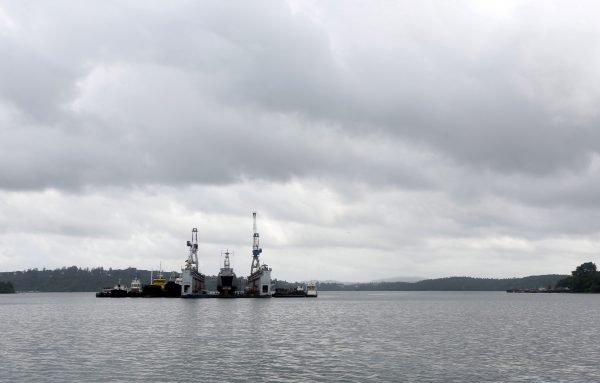While Japan’s expanding role in the Indo-Pacific has elicited close scrutiny, the potential for mutual economic gains has encouraged Japan to continue increasing its maritime presence in the Bay of Bengal.
Increasing regional stability in the Bay of Bengal has significant economic benefits for Japan as it imports almost 80 per cent of its foreign oil from Middle Eastern countries. Protecting its energy shipments through the SLOC in the Bay of Bengal remains imperative for Japan as it attempts to diversify its oil sources. Non-traditional threats of piracy, armed robbery and maritime terrorism threaten the security of these commercial shipping lanes.
Increasing connectivity with the rapidly developing economies of littoral countries provides Japan with many commercial opportunities. Myanmar experienced an average annual GDP growth of 7.2 per cent from 2012 to 2016, over twice the global average of 2.7 per cent. Highlighted in the Stable Seas: Bay of Bengal maritime security report, low coastal welfare, poor rule of law and under-developed blue economies in littoral countries diminishes the region’s economic potential and also acts as a catalyst for illicit activity, which further detracts from economic output. By contributing to coastal infrastructure and maritime law enforcement efforts, Japan has a positive impact on the region’s maritime stability and economic resilience.
Japan’s support of coastal infrastructure projects around the Bay of Bengal improves maritime security. Japan relies heavily on the Japan International Cooperation Agency (JICA), the country’s overseas aid agency, to fund local maritime infrastructure projects. On South Andaman Island, JICA is working with India to create a 15 megawatt diesel power plant and has expressed interest in follow-up projects. The power plant and associated infrastructure create a functioning forward base from which India can project its maritime surveillance around the Strait of Malacca.
Complemented by assets like India’s Boeing P-8s, the patrols launched from the islands will enhance India’s awareness in the maritime domain and help reduce non-traditional maritime threats like smuggling, illegal, unreported, and unregulated fishing (IUU), mixed migration and trafficking.
JICA also provided funding for Bangladesh’s Matarbari deep-sea port and to Myanmar’s Thilawa port. These ports contribute to coastal stability by increasing national revenue and providing local economic opportunities, reducing incentives for coastal communities to engage in illicit activities to sustain themselves. In playing a supporting role in ongoing coastal infrastructure projects and security initiatives, Japan is building strong relationships with local stakeholders while contributing to regional maritime stability.
Japan helps build up the maritime capacity of littoral countries in the Bay of Bengal by enhancing maritime law enforcement training and donating law enforcement vessels. In January 2020, the Japanese and Indian coast guards worked together in the Sahyog–Kaijin exercise, the 18th installation of the Japan–India joint exercise. The exercises allow Japan to share skillsets and law enforcement protocols while increasing interoperability in coordinating operations between Japan and India.
In the case of Bangladesh, Japan facilitated the country’s ability to contend with non-traditional threats by providing a JICA grant to obtain 20 rescue boats. Both the skillsets and assets Japan has provided for littoral countries build capacity to counter maritime security threats in the region.
Although Japan’s primary form of contribution to Bay of Bengal stability takes the form of capacity building and infrastructure projects, the country also uses Japan Maritime Self-Defence Force (MSDF) vessels to bolster maritime security and signal its regional commitment. MSDF deployed vessels to the Indian Ocean between 2001 and 2008 as part of Operation Enduring Freedom following the 9/11 terrorist attacks. In 2017 and 2018, Japan continued to show its commitment to protecting the vital SLOC running through the Bay of Bengal by deploying its largest warship — the JS Kaga helicopter carrier — to the region where it also conducted port visits in India and Sri Lanka.
The Stable Seas: Bay of Bengal maritime security report identifies several areas of focus in the Bay of Bengal that require attention in order to improve underlying drivers of regional maritime insecurity, including IUU fishing, piracy and armed robbery, and coastal welfare. Capacity-building support and resource contributions from extra-regional states like Japan enhance existing maritime stability initiatives.
The positive reception to Japan in the Bay of Bengal has even led to ongoing discussions between Japan and India, the region’s most powerful littoral country, on an Acquisition and Cross-Servicing Agreement which would allow Japan to access Indian naval facilities in the Andaman and Nicobar Islands and India to use the Japanese naval facilities in Djibouti and potentially bases in Japanese territory. Such a cooperative measure has the potential to build further trust between the two nations, increase interoperability during joint operations and allow for a more sustained overseas Japanese presence.
By working with nations to not only monitor and patrol against non-traditional security threats but also cooperatively address drivers of illicit maritime activity, Japan is actively contributing to the region’s security and prosperity.
Michael van Ginkel is a research assistant at Stable Seas, a program of the One Earth Future foundation, based in Colorado.
This article is drawn from a longer paper published here on Stable Seas.

